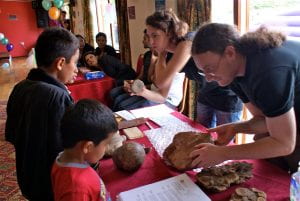The talks we have made available on this web site may be used in many ways: school teachers can use them as direct presentations to their pupils; individual academics or students can use the talks for one-off presentations.
We suggest that institutions consider organising an engagement/ outreach programme as a way to achieve greater impact.
Organisation of an outreach programme
The Outreach-Engagement Coordinator might like to organise a team of final-year undergraduates or graduate students to deliver the talks. These students should be keen volunteers, ideally with reasonable to good presentation skills, and certainly with an appetite for enthusing people with science.
 The Coordinator might also use a departmental administrator or secretary to co-ordinate bookings for the talks. It will be necessary to contact schools, and encourage them to make bookings, so it’s a good idea to have one person to promote the service and take initial bookings. The local education authority can probably provide a list of schools and/ or names of relevant teachers so first contact can be made. Then it may be easiest to generate bookings and to keep in touch by using an emailing list.
The Coordinator might also use a departmental administrator or secretary to co-ordinate bookings for the talks. It will be necessary to contact schools, and encourage them to make bookings, so it’s a good idea to have one person to promote the service and take initial bookings. The local education authority can probably provide a list of schools and/ or names of relevant teachers so first contact can be made. Then it may be easiest to generate bookings and to keep in touch by using an emailing list.
There will be some modest costs in visiting schools. It’s important to have a small budget so students can at least claim their travel costs for school visits. You may be able to tap into local funding for “widening participation” or “outreach”.
[Right] Catch ’em young! Trained student helpers explain about dinosaurs, and the children love to handle fossils and ask questions.
Training
The students who are to give the presentations must be trained – there’s nothing worse than sending someone out who lacks experience and gives a dreadful science show.
Your college or institution may already offer suitable training sessions. Another option is to invite a trainer to come from an existing Outreach training agency. Failing these, your outreach coordinator can train the students, perhaps using the Powerpoint we offer here:
This brief training module contains the basics, so that a small team of student presenters may avoid some of the obvious pitfalls. It’s important to run through the key points with the group, and then to ask each student to present a short prepared section of a science show.
You should make students aware that they may be rejected at this point if they lack the ability to engage an audience and to speak confidently and conversationally.
We strongly recommend that each student volunteer goes out on the road at least twice with an experienced presenter. They can perhaps participate in the show, and take over a larger part each time before they are sent out on their own.

